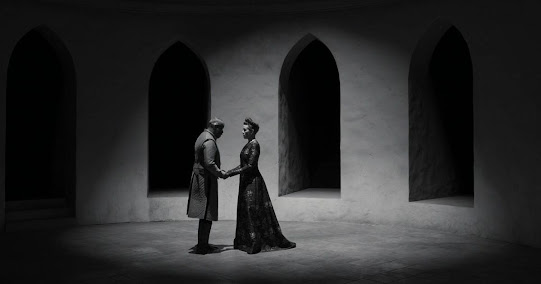There are no lousy performances and all the players seem at ease with the text, something you cannot say for many Hollywood version of Shakespeare. I particularly enjoyed Henry Melling, Corey Hawkins, Moses Ingram, Susan Berger, Alex Hassell, and Stephen Root. Kathryn Hunter's performance as the three weird sisters has been justly praised. For those seeking more of this special performer, I would urge them to track down the disc of Julie Taymor's production of A Midsummer's Night Dream from 2014.
Both Denzel Washington and Frances McDormand are fine leads. Macbeth, like Othello, is a warrior more at home planning battle strategy than palace intrigue. Washington is always good at macho swagger and gangster menace, but he is also good at portraying his character's confusion when confronted with forces he does not understand. McDormand has always struck me as flinty rather than fiery, so she is not ideally cast. She does, however, sink her teeth into the text to good effect. I would say she is probably the finest Lady Macbeth yet on screen, but that is damning with faint praise.
Overall, I have my niggles. The finest onscreen versions of Macbeth are Throne of Blood, the second season of Slings and Arrows, and the Orson Welles film from 1948. For a point of comparison I'm going to use the Welles version. It has a subpar Lady Macbeth and raggedy ass production values, but it has a primal spark and pagan passion that the Coen version lacks. Take the scene when Macbeth hires on Banquo's assassins. The killers in the Welles version are skeezy ragamuffins who seem subhuman. I want to take a bath after looking at them. The murderers in the Coen version seem anonymous in comparison.
I also think Coen has bungled the scene of Macbeth spying Banquo's ghost, one of the most powerful scenes in the play. Coen doesn't have Banquo come to the banquet table, but he has Macbeth spy him going down a corridor and then Macbeth pursues him. This ties in with the film's notion of the castle's hallways resembling the haunted corridors of the protagonists' mind, but something is lost. Having the ghost attend the banquet is a symbol of a pagan defilement of the Christian ritual of communion. This is a reflection of Macbeth's devil's bargain with the supernatural and his committing the mortal sin of regicide, a sin very much on the mind of Shakespeare's contemporaries who had just experienced Guy Fawkes attempt to blow up King James I. Ultimately, this is a somewhat bloodless and respectable Macbeth that never captures the pagan furies lurking in the text.






No comments:
Post a Comment